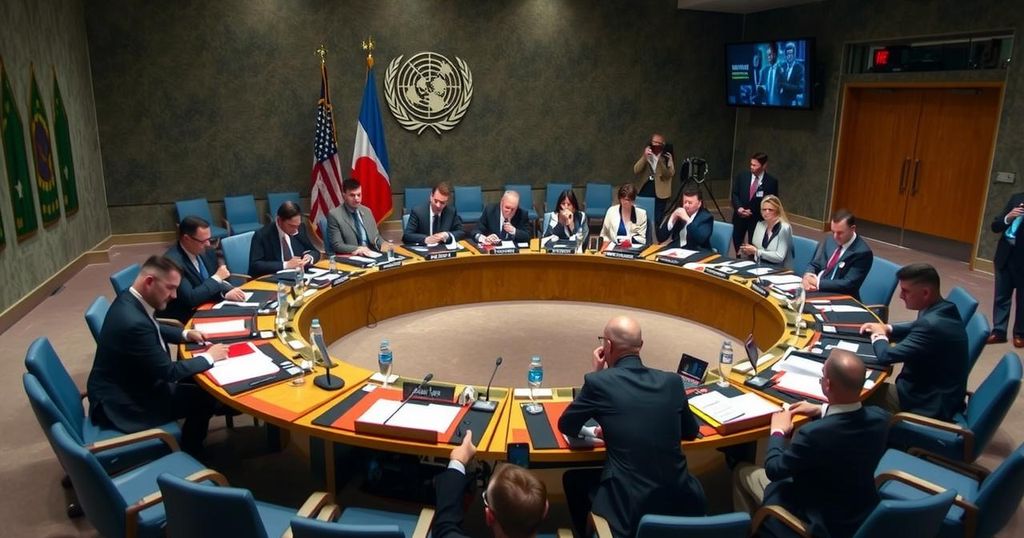The United Nations Security Council is preparing to meet to discuss the recent Israeli strikes on Iran, which followed Iran’s missile attack on Israel. The meeting was influenced by Iran’s request and is supported by Algeria, China, and Russia. Tensions are heightened due to ongoing conflicts involving Israel, Hamas, and Hezbollah, with additional geopolitical implications arising from Israel’s military actions and proposed cease-fire efforts from Egypt.
The United Nations Security Council is convening an emergency meeting this Monday to address the escalating tensions in the Middle East, primarily following Israel’s recent military strikes against Iran. The meeting was initiated at the request of Iran, who received backing from Algeria, China, and Russia. Iran’s Foreign Minister, Abbas Araqchi, articulated in a letter to the Council that the actions by the Israeli government represent “a grave threat to international peace and security and further destabilize an already fragile region.” The Israeli assault, which occurred early Saturday, involved multiple airstrikes targeting Iranian missile manufacturing plants, and appears to be a direct response to Iran’s previous launch of approximately 200 ballistic missiles towards Israel. This exchange of aggression is part of a broader conflict that has seen Israel engaged in warfare with Iranian-affiliated groups such as Hamas and Hezbollah. In light of these events, Iran’s Supreme Leader, Ayatollah Ali Khamenei, commented that while the severity of the Israeli strikes should neither be overstated nor minimized, he did not advocate for a direct retaliation. Conversely, Israeli Prime Minister Benjamin Netanyahu claimed the airstrikes were successful in diminishing Iran’s missile production capabilities. Furthermore, Iraq has lodged a formal complaint with the United Nations regarding Israel’s use of its airspace during the strike against Iran, condemning this as a violation of its sovereignty. On a separate front, Israeli forces conducted additional airstrikes in southern Lebanon, resulting in the deaths of at least five individuals in Tyre. In a diplomatic effort, Egypt’s President, Abdel-Fattah el-Sissi, proposed a two-day cease-fire in the ongoing Israel-Hamas conflict, which would also involve the release of hostages by Hamas and increased humanitarian aid for the Palestinian people. Yet, both Israel and Hamas have yet to respond to this proposition. As the conflict rages on, tensions remain high, with Israel’s intelligence chief, David Barnea, engaging in discussions in Doha with Qatari and U.S. officials to address the ongoing crisis, which began following a deadly attack by Hamas on October 7, 2023, resulting in substantial casualties on both sides. Israel’s counteroffensive has reportedly led to the deaths of nearly 43,000 Palestinians, according to the health ministry in the Gaza Strip, provoking calls for intervention and peace negotiations.
The conflict between Israel and Iran has reached a critical tipping point, characterized by a series of retaliatory attacks and escalatory rhetoric. Following Iran’s firing of ballistic missiles into Israeli territory, Israel’s response has involved targeted airstrikes against Iranian assets within its region. The dialectic of aggression has not only impacted bilateral relations but has drawn in multiple stakeholders, including the United Nations, regional powers like Iraq and Egypt, as well as global powers such as the United States and Russia, initiating discussions around humanitarian interventions and crisis management.
In summary, the situation in the Middle East is marked by escalating hostilities between Israel and Iran, alongside tensions involving neighboring countries and a humanitarian crisis in Gaza. The upcoming United Nations Security Council meeting aims to address these critical issues amidst ongoing conflicts and proposed diplomatic solutions. Egypt’s initiative for a cease-fire illustrates the urgency for dialogue; however, the lack of immediate responses from both Israel and Hamas complicates the pursuit of lasting peace.
Original Source: www.voanews.com







